PEP版小学英语四种时态复习
PEP小学英语六年级复习(四大时态)

六年级复习语法一些概念:主语:就是这句话说的是谁。
能够做主语的词:①代词:I(我)you (你,你们)he,she,it,we,they②名词:pen,dog,apple......;人名、地名;称呼:mother,father....be动词:am,is,are;was,were;be结构词:do,does,did;(情态动词)can,could,shall,should,must,will......四种时态:一般过去时:表示过去某一时间发生的动作或存在的状态。
基本结构:①主语+was/were+其他. 表示过去的状态(怎么样)②主语+动词过去式+其他. 表示过去的活动(做什么)判断依据:①过去时间last night/week/month/year/weekend,yesterday,the day before yesterday,...ago;②动词过去式(六下69页)一般现在时:表示现在的时间内经常发生的动作或存在的状态。
基本结构:①主语+am/is/are+其他. 表示现在的状态②主语+动词+其他. 表示经常性或习惯性的动作注意:当主语相当于he,she,it时,动词要用第三人称单数形式。
判断依据:句子中有often,usually,sometimes,always(总是),never(从不),on the weekend,every...等现在进行时:表示说话时正在进行的动作或状态。
基本结构:主语+am/is/are+动词ing+其他.判断依据:标志词now,Look!,Listen!,It’s+几点钟.一般将来时:表示将要发生的动作或存在的状态,也表示计划、打算。
基本结构:①主语+am/is/are+going to+动词原形+其他.②主语+will+动词原形+其他.判断依据:标志词soon,tomorrow,the day after tomorrow,next day /week /month /year /weekend,after school /class,one day,in the future......注意:表达自己将来想做什么职业:I’m going to be a /an +职业. 连词成句答题流程:动词+主语+其他?? 特殊疑问词+一般疑问句(如上)? .注意:陈述句中的 否定句 :①主语+be 动词+not +其他. ②主语+结构词+not +动词原形+其他. 一些需要注意的语法点:①有结构词(见上)的疑问句和否定句中的动词用原形。
PEP小学英语总复习—四种时态的区分与运用精品PPT课件 图文
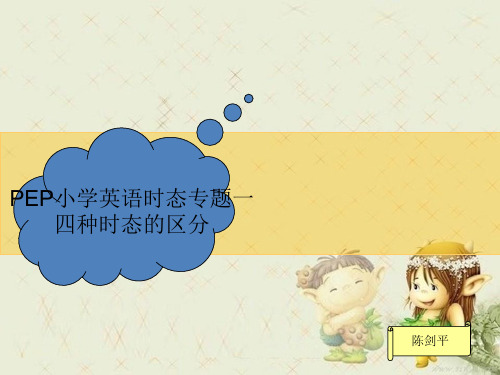
A is going to be; will have B will be; is having
C will be; is going to have D will have; is going
to be
3、Li Ming is 10 years old now, next year he
_____11.
• make-made, read-read write-wrote, draw-drew, drinkdrank, fly-flew, ride-rode speak-spoke sweep-swept, buybought swim-swam, sit-sat bring—brought can-could cutcut become-became begin-began draw-drew feel-felt find-found forget-forgot hear-heard keep-kept know-knew learn-learnt (learned) leave-left let-let lose-lost
二、一般现在时:
1、概念:经常、反复发生的动作或行为及 现在的某种状况。
2、标志词: always, usually, often, sometimes, every week (day, year, month…), once a week, on Sundays, etc. 3、基本结构:①be动词;②行为动词 e.g:He goes to school every day.
3、基本结构:
• ①be动词(注意be的人称变化,用过去式) I was in the classroom yesterday morning. He was in the classroom yesterday morning. They were in the classroom yesterday morning.
小学PEP英语 四种时态总结
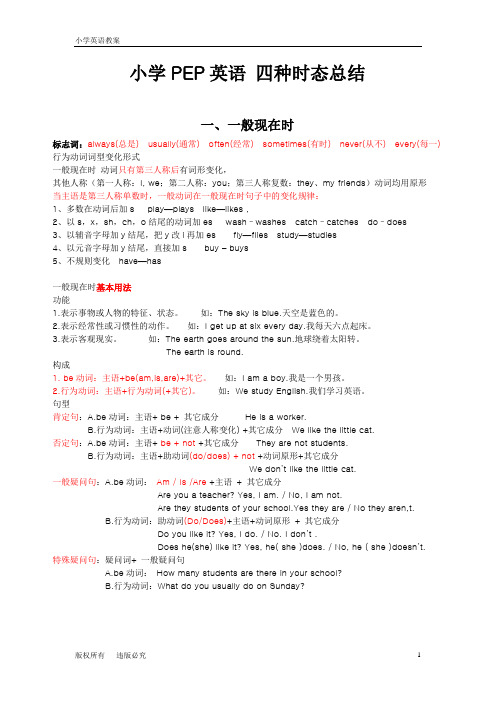
小学PEP英语四种时态总结一、一般现在时标志词:always(总是) usually(通常) often(经常) sometimes(有时) never(从不) every(每一)行为动词词型变化形式一般现在时动词只有第三人称后有词形变化,其他人称(第一人称:I, we;第二人称:you;第三人称复数:they、my friends)动词均用原形当主语是第三人称单数时,一般动词在一般现在时句子中的变化规律:1、多数在动词后加s play—plays like—likes ,2、以s,x,sh,ch,o结尾的动词加es wash–washes catch–catches do–does3、以辅音字母加y结尾,把y改i再加es fly—flies study—studies4、以元音字母加y结尾,直接加s buy – buys5、不规则变化have—has一般现在时基本用法功能1.表示事物或人物的特征、状态。
如:The sky is blue.天空是蓝色的。
2.表示经常性或习惯性的动作。
如:I get up at six every day.我每天六点起床。
3.表示客观现实。
如:The earth goes around the sun.地球绕着太阳转。
The earth is round.构成1. be动词:主语+be(am,is,are)+其它。
如:I am a boy.我是一个男孩。
2.行为动词:主语+行为动词(+其它)。
如:We study English.我们学习英语。
句型肯定句:A.be动词:主语+ be + 其它成分He is a worker.B.行为动词:主语+动词(注意人称变化) +其它成分We like the little cat.否定句:A.be动词:主语+ be + not +其它成分They are not students.B.行为动词:主语+助动词(do/does) + not +动词原形+其它成分We don’t like the little cat.一般疑问句:A.be动词:Am / Is /Are +主语+ 其它成分Are you a teacher? Yes, I am. / No, I am not.Are they students of your school.Yes they are / No they aren,t.B.行为动词:助动词(Do/Does)+主语+动词原形+ 其它成分Do you like it? Yes, I do. / No. I don’t .Does he(she) like it? Yes, he( she )does. / No, he ( she )doesn’t.特殊疑问句:疑问词+ 一般疑问句A.be动词:How many students are there in your school?B.行为动词:What do you usually do on Sunday?一般现在时动词be和have的变化形式1.动词Be 叫连系动词, 用法:第一人称单数用am,第三人称单数用is,其它人称用are。
pep小学六年级四种时态汇总
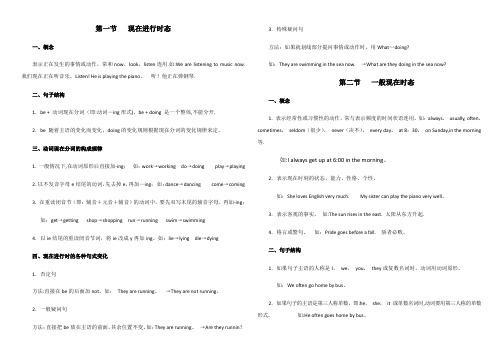
第一节现在进行时态一、概念表示正在发生的事情或动作,常和now,look,listen连用.如:We are listening to music now.我们现在正在听音乐。
Listen! He is playing the piano。
听!他正在弹钢琴.二、句子结构1.be + 动词现在分词(即:动词—ing形式),be + doing 是一个整体,不能分开.2.be 随着主语的变化而变化,doing的变化规则根据现在分词的变化规律来定。
三、动词现在分词的构成规律1.一般情况下,在动词原形后直接加-ing;如:work→working do→doing play→playing 2.以不发音字母e结尾的动词,先去掉e,再加—ing;如:dance→dancing come→coming 3.在重读闭音节(即:辅音+元音+辅音)的动词中,要先双写末尾的辅音字母,再加-ing;如:get→getting shop→shopping run→running swim→swimming 4.以ie结尾的重读闭音节词,将ie改成y再加ing。
如:lie→lying die→dying四、现在进行时的各种句式变化1.否定句方法:直接在be的后面加not。
如:They are running。
→They are not running。
2.一般疑问句方法:直接把be放在主语的前面,其余位置不变。
如:They are running。
→Are they runnin?3.特殊疑问句方法:如果就划线部分提问事情或动作时,用What…doing?如:They are swimming in the sea now.→What are they doing in the sea now?第二节一般现在时态一、概念1.表示经常性或习惯性的动作,常与表示频度的时间状语连用。
如:always,usually, often,sometimes,seldom(很少),never(决不),every day,at 8:30,on Sunday,in the morning 等.如:I always get up at 6:00 in the morning。
四大时态按要求完成句子训练(讲义)人教PEP版英语六年级下册
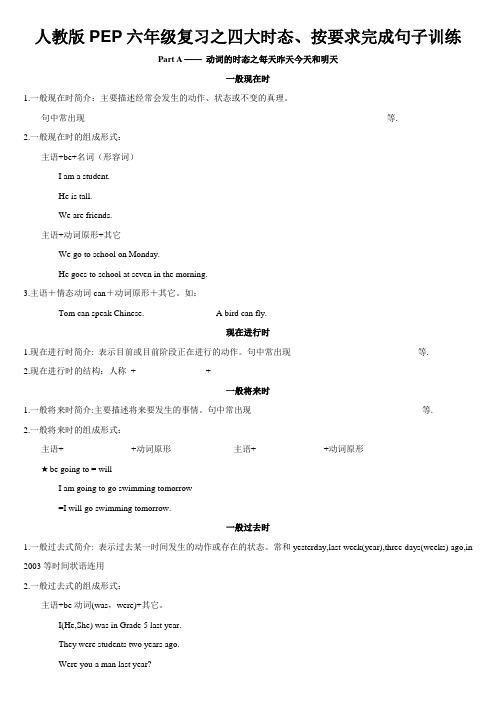
人教版PEP六年级复习之四大时态、按要求完成句子训练Part A ——动词的时态之每天昨天今天和明天一般现在时1.一般现在时简介:主要描述经常会发生的动作、状态或不变的真理。
句中常出现____________________________________________________________________等.2.一般现在时的组成形式:主语+be+名词(形容词)I am a student.He is tall.We are friends.主语+动词原形+其它We go to school on Monday.He goes to school at seven in the morning.3.主语+情态动词can+动词原形+其它。
如:Tom can speak Chinese. A bird can fly.现在进行时1.现在进行时简介: 表示目前或目前阶段正在进行的动作。
句中常出现____________________________等.2.现在进行时的结构:人称+ _______________ + _______________一般将来时1.一般将来时简介:主要描述将来要发生的事情。
句中常出现______________________________________等.2.一般将来时的组成形式:主语+ _______________+动词原形主语+ _______________+动词原形★be going to = willI am going to go swimming tomorrow=I will go swimming tomorrow.一般过去时1.一般过去式简介: 表示过去某一时间发生的动作或存在的状态。
常和yesterday,last week(year),three days(weeks) ago,in 2003等时间状语连用2.一般过去式的组成形式:主语+be动词(was,were)+其它。
pep人教版小学六年级英语概念(四个时态) 总复习
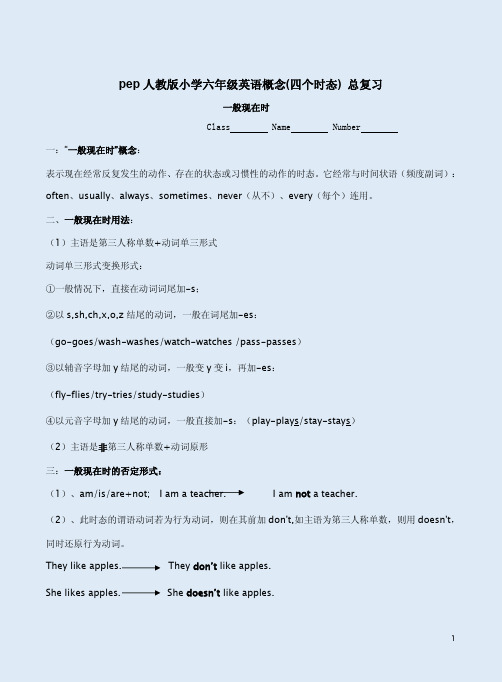
pep人教版小学六年级英语概念(四个时态)总复习一般现在时Class Name Number一:“一般现在时”概念:表示现在经常反复发生的动作、存在的状态或习惯性的动作的时态。
它经常与时间状语(频度副词):often、usually、always、sometimes、never(从不)、every(每个)连用。
二、一般现在时用法:(1)主语是第三人称单数+动词单三形式动词单三形式变换形式:①一般情况下,直接在动词词尾加-s;②以s,sh,ch,x,o,z结尾的动词,一般在词尾加-es:(go-goes/wash-washes/watch-watches/pass-passes)③以辅音字母加y结尾的动词,一般变y变i,再加-es:(fly-flies/try-tries/study-studies)④以元音字母加y结尾的动词,一般直接加-s:(play-plays/stay-stays)(2)主语是非第三人称单数+动词原形三:一般现在时的否定形式:(1)、am/is/are+not;I am a teacher.I am not a teacher.(2)、此时态的谓语动词若为行为动词,则在其前加don't,如主语为第三人称单数,则用doesn't,同时还原行为动词。
They like apples.They don’t like apples.She likes apples.She doesn’t like apples.四:如何改一般疑问句:①把be动词放于句首;He is a student.Is he a student?②用助动词do/does提问—动词还原—句末变问号。
☆还需注意细节变化:如my-your、many-any等。
They like apples.Do they like apples?She likes apples.Does she like apples?一般过去时1.一般过去时表示过去某个时间发生的动作或存在的状态,常和表示过去的时间状语连用。
pep小学英语四个时态及其练习打印
小学英语四种时态及练习一、一般现在时1.意义:表示习惯或者爱好。
如:I get up at six every day.我每天六点起床。
I like drawing pictures.我喜欢画画。
2.结构:I am a boy.我是一个男孩。
We study English.我们学习英语。
注意:当主语为第三人称单数(he, she,it,Mike)时,要在动词后加"-s"或"-es"。
如:Mary likes Chinese.玛丽喜欢汉语。
3.时间标志:usually,ofen, sometimes, always, everyday, on Sundays4.动词+s的变化规则1)一般情况下,直接加-s,如:cook-cooks, milk-milks2)以s. x. sh. ch. o结尾,加-es,如: wash-washes, watch-watches, go-goes 3)以“辅音字母+y”结尾,变y为i, 再加-es,如:study-studies练习一般现在时用法专练:一、写出下列动词的第三人称单数drink ________ go _______ stay ________ make ________look _________ have_______ pass_______ carry ____come________ watch______ plant_______ fly ________study_______ brush________ do_________ teach_______二、用括号内动词的适当形式填空。
1. He often ___has_____(have) dinner at home.2. Daniel and Tommy _are______(be) in Class One.3. We _don’t_watch_____(not watch) TV on Monday.4. Nick _doesn’t___go___(not go) to the zoo on Sunday.5. __Do____ they ____like____(like) the World Cup?6. What __do_____they often ___do____(do) on Saturdays?7. ___Do____ your parents __read_____(read) newspapers every day?8. The girl _______(teaches) us English on Sundays.9. She and I _____take___(take) a walk together every evening.10. There ___is_____(be) some water in the bottle.11. Mike _______(likes) cooking.12. They _______(have) the same hobby.13. My aunt _______(looks) after her baby carefully.14. You always _______(do) your homework well.15. I ___am____(be) ill. I’m staying in bed.16. She ___goes____(go) to school from Monday to Friday.17. Liu Tao ___does____(do) not like PE.18. The child often _______(watches) TV in the evening.19. Su Hai and Su Yang _______(have) eight lessons this term.20. -What day ____is___(be) it today?-It’s Saturday.三、按照要求改写句子1. Daniel watches TV every evening.(改为否定句)______________________________________________________2.I do my homework every day.(改为一般疑问句,作否定回答)____________________________________________________3. She likes milk.(改为一般疑问句,作肯定回答)_______________________________________________________4. Amy likes playing computer games. (改为一般疑问句,作否定回答)___________________________________________________5. We don’t go to school every morning.(改为肯定句)_______________________________________________________6. He doesn’t speak English very well.(改为肯定句)_____________________________________________________7. I like taking photos in the park.(对划线部分提问)_____________________________________________________8. John comes from Canada.(对划线部分提问)____________________________________________________9. She is always a good student?(改为一般疑问句,作否定回答)________________________________________________________10. Simon and Daniel like going skating.(改为否定句)___________________________________________________五、改错(划出错误的地方,将正确的写在横线上)1. Is your brother speak English? __________________2. Does he likes going fishing? _________________3. He likes play games after class. __________________4. Mr. Wu teachs us English. __________________5. She don’t do her homework on Sundays. _________________二、现在进行时1.意义:现在进行时表示现在正在进行或发生的动作。
PEP小学英语四种时态
P E P小学英语四种时态(总4页)--本页仅作为文档封面,使用时请直接删除即可----内页可以根据需求调整合适字体及大小--pep小学英语四大基本时态一、一般现在时1.一般现在时表示一般情况下经常发生的动作或存在的状态。
常与 usually, sometimes, often, always等词连用。
2.一般现在时的谓语动词为be动词时,be的变化遵循“我用am, 你用are, is用在他她它,复数全用are”的规律。
3.一般现在时的谓语动词为其它动词时,当主语为第三人称单数时,动词要用第三人称单数形式。
如:Mary likes Chinese.玛丽喜欢汉语。
4.动词第三人称单数的变化规则:(1)一般的动词,直接在词尾加s,如:cook-cooks, like-likes.(2)以s,x,sh,ch,o等结尾的动词,加es,如:wash-washes, watch-watches, go-goes, do-does.(3)以辅音字母加y结尾的动词,变y为i, 再加es,如:study-studies.(4)不规则变化,如:have-has.否定句:主语+ be + not +其它。
如:He is not a worker.他不是一名工人。
一般疑问句:Be +主语+其它如:Are you a student(2)行为动词的变化。
否定句:主语+ don't( doesn't ) +动词原形(+其它)。
如:I don't like bread. 当主语为第三人称单数时,要用doesn't构成否定句。
如:He doesn't like PE.一般疑问句:Do( Does ) +主语+动词原形+其它如:Do you often play chess当主语为第三人称单数时,要用does构成一般疑问句。
如:Does she like PE? 特殊疑问句:疑问词+一般疑问句如:How does your father go to work现在进行时1.现在进行时表示现在正在进行或发生的动作。
四大时态重点笔记(素材)人教PEP版英语六年级下册
时态时态(一)1、简介英语的时态(Tense)是一种动词形式,不同时态用于表示不同时间与方式。
它是表示行为、动作、状态的各种时间条件下的动词形式,一共有16种时态。
常用的有12种,如下面表格中黑字部分。
其余4种(红色字体)需要与从句搭配使用,将在从句部分进行描述。
2、主要四种时态本章节先学习四种时态:•一般现在时:do /does,最近都会发生的相同的动作(表示常态平常,总是,老是这样)•一般过去式:did,动作在过去发生•一般将来时:be going to do,动作还未发生(有准备,打算的意味)。
•现在进行时:be doing,动作正在发生(正在进行的动作)3、句子的公式针对四种基本时态,句子的公式疑问词+ 时表词+ 主语+ 句剩+ 动词+ 其他【注】主语是动作的发起者,宾语是动作的承受者,句剩只有在一般将来时才用!【例句】1、你刚才去哪儿了?Where did you go?2、你平常都什么时候回来?When do you come back?3、你在吃什么?What are you eating?4、你怎么跟他说的?How did you tell him4、人称相关它it it its its itself他们They them their theirs themselves 【注】此表格格外重要,不要忽视!!!时态(二)1、简介•时态和句子结构清楚后,开始造句,按句子类型分为陈述句和疑问句。
•陈述句又分为肯定句和否定句;疑问句分为特殊疑问句和一般疑问句。
2、一般疑问句与特殊疑问句一般疑问句疑问词时表词主语句剩动词其他Do you know himDid You see herAre you going to eatIs he working特殊疑问句How do you know him Where did You see herWhen are you going to eatHow is he working【注】1、不可以延续的动词(例如:come来,go去,leave离开,arrive到达,start/begin开始)可用现在进行时表将来Are you going to New York = Are you going to go to New York?2、Who和whom的区别:who用于主语或者宾语,whom只能用于宾语。
小学的四大时态知识点总结
小学的四大时态知识点总结小学英语教学中,时态是学生必须掌握的基本语法点之一。
以下是小学阶段学生需要掌握的四大时态知识点的总结:1. 一般现在时(Simple Present Tense)- 用法:表示经常发生的动作或状态,或者表示客观事实。
- 结构:主语 + 动词原形/动词的第三人称单数形式(如:He/She/It + 动词-s/-es)。
- 例句:She goes to school every day.(她每天去上学。
)2. 现在进行时(Present Continuous Tense)- 用法:表示正在进行或发生的动作。
- 结构:主语 + be动词(am/is/are)+ 动词的现在分词形式(-ing)。
- 例句:They are playing football now.(他们现在正在踢足球。
)3. 一般过去时(Simple Past Tense)- 用法:表示过去发生的动作或状态。
- 结构:主语 + 动词的过去式。
- 例句:He visited his grandparents last week.(他上周拜访了他的祖父母。
)4. 一般将来时(Simple Future Tense)- 用法:表示将来发生的动作或状态。
- 结构:主语 + will + 动词原形;或主语 + be going to + 动词原形。
- 例句:She will go to the library tomorrow.(她明天将去图书馆。
)掌握这些基本时态对于小学生来说至关重要,它们是构建句子和表达思想的基础。
在学习过程中,学生应该通过大量的练习和实际应用来加深对这些时态的理解和运用。
同时,老师和家长也应该鼓励学生在日常生活中使用英语,以提高他们的语言能力。
通过不断的练习和应用,学生将能够更加熟练地掌握这些时态,并在英语交流中更加自信。
- 1、下载文档前请自行甄别文档内容的完整性,平台不提供额外的编辑、内容补充、找答案等附加服务。
- 2、"仅部分预览"的文档,不可在线预览部分如存在完整性等问题,可反馈申请退款(可完整预览的文档不适用该条件!)。
- 3、如文档侵犯您的权益,请联系客服反馈,我们会尽快为您处理(人工客服工作时间:9:00-18:30)。
3. The pen was on the desk just now. The pen wasn’t on the desk just now. 否定:__________________________
Was the pen on the desk just now? 一般疑问句:______________________
小学阶段四种时态复习
一、一般过去时:表示事情已经发生。
常见时间状语:last, yesterday, just now, … ago,
句子特点:动词用过去式. 动词过去式分规则动词和不规则动词。 句子结构:肯定句:主语 + V.ed… 否定句:主语+助动词did+ not + V.(原型)… 一般疑问句:助动词Did +主语+ V.(原型)…?
二、一般现在时:表示经常发生的动作,或是 自然规律、常理。 常与every…, always, usually, often, sometimes等 表经常的时间状语连用。 注:当主语是第三人称单数时, 动词也要用第三人称单数。 动词第三人称单数: A:直接加s (如,plays、runs) B:以s, x, o, ch, sh结尾的单词加es (如washes, watches, does, fixes, misses) C:以辅音字母加y结尾的单词,改y为i加es。 (如:studies, carries, flies)
3. Nancy is going to play the piano tomorrow. Nancy isn’t going to play the piano tomorrow. 否定:__________________________
Is Nancy going to play the piano tomorrow? 一般疑问句: ______________________
eg:1. I am going to play football this afternoon. I am not going to play football this afternoon. 否定:__________________________
Am I going to play football this afternoon? 一般疑问句:______________________
四、一般将来时:表示将要发生的事情。
常见时间状语:next,tomorrow, soon等
肯定句:主语+be动词+going to + V原形… 否定句:主语+be动词+not + going to + V原形…
一般疑问句:be动词 +主语+ going to + V原形…?
句子结构: 肯定句:主语 + V.(主语为三单时加s)…
否定句:主语+助动词do/does+ not + V.(原型)…
一般疑问句:助动词Do/Does +主语+ V.(原型)…?
eg:1. We often play in the playground after school. 否定: We often don’t play in the playground after school. 一般疑问句: Do we often play in the playground after school? 2. He usually gets up at six o’clock. 否定: He usually doesn’t get up at six o’clock. 一般疑问句:Does he usually get up at six o’clock? 3. Mike sometimes goes to the park with his sister. 否定: Mike sometimes doesn’t go to the park with his sister. 一般疑问句: Does Mike sometimes go to the park with his sister? 4 The sun rises in the east. (太阳从东边升起) 否定: The sun doesn’t rise in the east. 一般疑问句: Does the sun rise in the east?
eg:1. I am listening to the music now.
I am not listening to the music now. 否定:__________________________ Am I listening to the music now ? 一般疑问句:________________________ 2. Listen! She is singing . Listen! She isn’t singing . 否定:__________________________ Listen! Is she singing ? 一般疑问句:________________________
三、现在进行时:表示正在进行的、发生的动作。 通常在句子中有以下的词:now, look, listen.
句子的结构如下:
肯定句:主语+be动词 + V.ing… 否定句:主语+be动词+not + V.ing…
一般疑问句:be动词 +主语+ V.ing…?
am,is,are的用法口决:
我用am,你用are。 is 跟着她,他,它, 单数is,复数are
2. They all went to the mountains yesterday morning. all didn’t go to the mountains yesterday morning. 否定:They __________________________
Did they all go to the mountains yesterday morning? 一般疑问句:________________________
2. We are going to New York next week. We aren’t going to New York next week. 否定:__________________________
Are we going to New York next week? 一般疑问句: ______________________
eg:1. I had an exciting party last weekend. I didn’t have an exciting party last weekend. 否定:__________________________ 一般疑问句 Did I have an exciting party last weekend?
be动词用过去式:am,is—was; are—were 句子结构: 肯定句:主语 + was/were… 否定句:主语 + was/were +not +… 一般疑问句:was/were+主语+…?
Eg 1. I was a student some years ago. I wasn’t a student some years ago. 否定:__________________________ Was I a student some years ago? 一般疑问句:________________________
其中动词的ing形式有如下方法: A. 在动词后直接加ing: 如:go- going , wash-washing, fly—flying B. 以单个元音+单个辅音+e结尾 , 去掉e加ing, 如 :drive—driving;ride—riding;make—making C. 某些单词要双写词尾的字母: 如:swim- swimming; run—running;get—getting;
